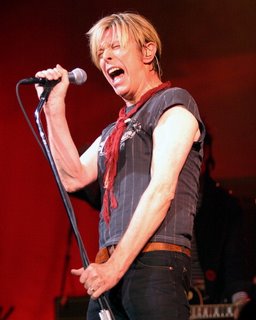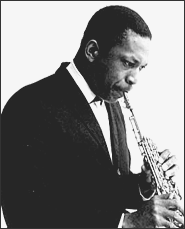Thursday, September 21, 2006
Mark Of The Beast??
When the Social Security system was created back in the 1930s, people nervous about the government creating a citizen registry were assured that the data would only be used for administering the program. But over the decades, the Social Security has become a de facto national ID number. Many government forms, as well as financial applications, contracts, etc., require it. I'll hav eto do some research on it, but I remember hearing before that legally, one can't be compelled to provide it in most of these instances. I hope my memory is right.
Interim Task Force Recommends Social Security Number Limits
Monday, September 18, 2006
Top 885 Artists-Numbers 11-20
Billie Holiday
Artie Shaw
Jeff Buckley
Richard Thompson
Marvin Gaye
The Smiths
Patsy Cline
Van Morrison
The Cure
Renaissance
Tuesday, September 12, 2006
Top 885 Artists-Number 1-Johnny Cash

Although he originated his career in Nashville (Sun Records), Johnny Cash was never "of Nashville", at least not for most of his professional life. His independent attitude and frequent brushes with the law saw to that. But in much of his music, in songs like "Folsom Prison Blues", "Cry Cry Cry", "Ring Of Fire", "Ghost Riders In The Sky", and a hundred more, there is a purity and nobility that comes through more than any other performer of the 20th Century. His deep baritone voice and a style that combined the world-weariness of country and the emotional honesty of folk, with the rebelliousness of rock.
In the 1990s and beyond, his career enjoyed a resurgence. He worked with producer Rick Rubin on a series of recordings; he covered "Hurt" by Nine Inch Nails and performed with U2. But really, he was cool even when Nashville and the larger musical establishment didn't think he was cool.
As shown in the Academy Award-winning film "I Walk The Line," Johnny could raise sure raise hell, eventually saving himself, with a lot of help from June Carter. Sometimes the biggest sinners do make the best saints.
Top 885 Artists-Number 2-Ella Fitzgerald

Lady Ella's career spanned six decades, but it was her work beginning in the late 1950s, interpreting the Great American Songbook, that defined her as a stellar figure, as far as I'm concerned. Among the greats she covered were Cole Porter, Duke Ellington, Irving Berlin, the Gershwins, and Harold Arlen. And besides that, she put her hornlike vocal style (and three-octave range) to good use on various records over the years, including collaborations with giants like Louis Armstrong and Count Basie.
Top 885 Artists-Number 3-Elvis Costello

Elvis Costello is one of the first artists I associated with the New Wave, but I soon learned that his music and style were a lot more complex. He didn't really fit in with Television, the New York Dolls, or other acts of the time. And over the years, his music has been all over the place, from ska lite to R&B, to post-punk pop, to classical, and, to jazzy ballads. He's collaborated with Paul McCartney, Tony Bennett, Brian Eno, Chet Baker, Allen Toussaint, Lucinda Williams, and the Brodsky Quartet. But probably my favorite record of his, even more than Blood and Chocolate, was Almost Blue. He rips through a fine selection of country music covers, from Hank Williams' "Why Don't You Love Me" to Merle Haggard's "Tonight The Bottle Let Me Down", and Gram Parsons' "How Much I Lied". He captures what makes real country music so great: the weepy ballads, and jumpin' honky-tonk.
Top 885 Artists-Number 5-David Bowie

And what wasn't to like? There's the big catalog of fine songs: "Space Oddity", "The Jean Genie", "Suffragette City," "Golden Years", "Rebel Rebel", and many more. But what has made Bowie so great is that he was a true rock icon without being stuck as any specific one. In a few years, he morphed from a folkie to the androgynous glam alien Ziggy Stardust to the alienated addict, the Thin White Duke. And along the way, whether working with the Spiders, or producer Brian Eno and guitarists Robert Fripp and Adrian Belew, Bowie also incorporated elements of funk, R&B, and pop into his music.
Top 885 Artists-Number 4-Miles Davis
 When it comes to Miles Davis, nearly everybody thinks of Kind Of Blue, which is a masterpiece. Bill Evans is on piano, of course, and all the tunes are deservedly considered standards. But there are two other records I like which also show his genius.
When it comes to Miles Davis, nearly everybody thinks of Kind Of Blue, which is a masterpiece. Bill Evans is on piano, of course, and all the tunes are deservedly considered standards. But there are two other records I like which also show his genius.A Tribute To Jack Johnson is the soundtrack to a film biography of the famous boxer. Here, his band includes John McLaughlin on guitar, Steve Grossman on soprano sax, Billy Cobham on drums, Herbie Hancock on organ, and Michael Henderson on electric bass. This is a fine jazz-rock record, where Davis & Co. solo at will, and they just sizzle.
On Sketches of Spain, Davis teamed again with arranger Gil Evans. In adapting and building around a classical composition, Rodrigo's "Concierto De Aranjuez", Davis showcases his mastery of the flugelhorn as well as the trumpet. Some self-styled jazz purists don't like this record, taking issue with its incredible lyricism. That's too bad, and rather fortunate that Davis and many fans over the years have brushed this opinion aside. It is a lovely record, with an emphasis on flamenco and a relaxed tempo.
Monday, September 11, 2006
9/11, Five Years On
The attacks of 9/11 is such a complex, multi-faceted topic that I could literally talk about it for hours. But I want to focus on something that's bothered me since sometime in 2002, after the initial shock, sadness and anger wore off.
Where is the sacrifice? After the initial sentimentality and symbolism slowly wore off, we again have forgotten that the world is a lot more chaotic and violent than our splendid isolation has made us see first-hand.
There was an opportunity for the American people, the Bush administration, the Congress, and other elected officials at all levels, to ask Americans, as JFK, said "what you can do for your country." To an extent, some did.
But I think about what happened during World War II, our last declared war. There were shortages as industrial and agricultural production geared up to support the war effort; people grew Victory Gardens and collected scrap materials. Celebrities felt duty-bound to support the war effort.
This time, the Patriot Act notwithstanding, uhhh ... nada. Nope, we got tax cuts. And encouragement to go shopping.
Now maybe it's the nature of the challenge that's different. Maybe because it's more daunting in some respects. We were told that this is a "war" that will take years to fight, and on many different fronts. I worry that our patience is wearing thin, as so many people, left, right, neocon, progressive, etc., are at each others' throats in the same stupid political battles. And this is to our great peril.
Top 885 Artists-Number 6-The Clash

The Clash were at their height of creativity and popularity with their third record, London Calling. It is a masterpiece, combining punk with elements of rockabilly and ska. There are some stellar tracks spread out on the double-record, like "Train In Vain", "Clampdown," and the title song. But, like punk itself, the Clash's fall was about as quick as its rise. The band broke up after Mick Jones was kicked out, and any thought of a reunion was put to rest with the death of Joe Strummer. But they will always be remembered for the furious, political energy they brought to the stage.
Friday, September 08, 2006
Top 885 Artists-Number 7-John Coltrane

His style evolved dramatically over the years. After making a name for himself in conventional jazz as a sideman for Miles Davis, his early solo work saw him begin to develop a highly improvised. formless "free jazz" that featured extended runs of playing hundreds of notes in a short time. His work in the mid-1960s became increasingly atonal and dissonant, as he concentrated almost solely on the tenor sax and worked with other free jazz artists on his recordings.
My favorite Coltrane has to be Coltrane's Sound. With the first edition of the classic Coltrane band (with Steve Davis on bass), this dark and brooding masterpiece reworks standard bop. "Liberia" is a version of "A Night In Tunisia", and "Satellite" redoes "How High The Moon".
Thursday, September 07, 2006
Top 885 Artists-Number 8-Irving Berlin

"White Christmas," originally written for the Bing Crosby film Holiday Inn, became a huge hit in the late 1940s, and was, until a few years ago, the biggest-selling single in history. A proud patriot, Berlin also wrote "God Bless America," made most famous by Kate Smith.
And, there are other great songs as well: "Alexander's Ragtime Band", "Easter Parade," "Cheek To Cheek", "Isn't This A Lovely Day", "Puttin' On The Ritz", "Steppin' Out With My Baby", and "Supper Time". He wrote the music and lyrics for Rogers' and Hammerstein's Broadway smash hit, Annie Get Your Gun. Then there's the light-as-a-feather "Blue Skies", originally written for the Rodgers and Hart musical Betsy. The lyrics were re-done when the movie Blue Skies, starring Bing Crosby and Fred Astaire, was made.
